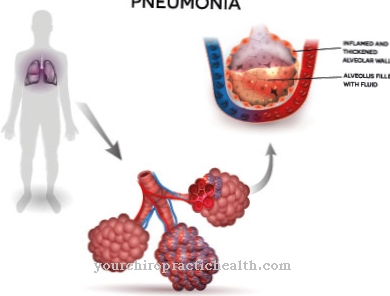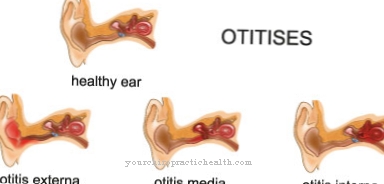Hashimoto's thyroiditis is the most common autoimmune, chronic inflammation of the thyroid gland, the cause of which has not yet been clarified. Women are about nine times more likely to suffer from Hashimoto's thyroiditis than men, although the disease is usually easy to treat.
What is Hashimoto's thyroiditis

Hashimoto's thyroiditis is a chronic inflammation of the thyroid that can be traced back to a dysregulation of the body's own defenses (autoimmune thyroid disease). Characteristic symptoms of Hashimoto's thyroiditis are frequent tiredness, weight gain, an increased sensation of cold and edema (water retention).
While Hashimoto's thyroiditis manifests itself in the long term in an underactive thyroid (hypothyroiditis), at the beginning of the disease there can also be an overactive thyroid (Hashitoxicosis), which among other things can be associated with irritability, insomnia, palpitations, cravings, weight loss, and a disrupted menstrual cycle.
Hashimoto's thyroiditis is divided into two subforms. While the more common atrophic form is accompanied by a loss of thyroid cells, in the rarer hypertrophic form of Hashimoto's thyroiditis, the thyroid gland enlarges and a goiter (goiter) forms.
causes
Hashimoto's thyroiditis is caused by a dysregulated immune system that attacks the body's own structures of the thyroid, triggers inflammatory processes there and permanently damages the organ and its hormone production. What triggers this autoimmune dysregulation has not yet been clarified.
In addition to a genetic predisposition (disposition), bacterial and viral infections with severe courses (shingles, Pfeiffer's glandular fever), malfunctions of the adrenal cortex as well as environmental factors and stress are suspected to be possible triggers for Hashimoto's thyroiditis.
Microchimerism, in which, for example, cells are exchanged between mother and child via the placenta, and the intake of very high amounts of iodine or an iodine intolerance, which can lead to a manifestation of Hashimoto's thyroiditis in a predisposition, are also discussed. Hashimoto's thyroiditis is also associated with type I diabetes mellitus and vitiligo (white spot disease).
Symptoms, ailments & signs
Hashimoto's thyroiditis usually begins insidiously with mild symptoms that are not associated with the thyroid gland. These include, for example, unwanted weight gain despite unchanged eating habits, constipation and a decline in concentration and performance. Affected people freeze easily, are constantly tired, listless and prone to depressive moods.
A decreased pulse rate and an increase in blood pressure are common. Other possible signs are very cool and dry skin, brittle nails and severe hair loss. Increased water retention in the tissue (edema) is noticeable through a pasty consistency of the skin.
In women, cycle disorders can develop as part of Hashimoto's thyroiditis: The lack of ovulation can be the reason for an unfulfilled desire to have children. During pregnancy, the disease affects the baby's development and often triggers a miscarriage. Men often complain of erectile dysfunction, in both sexes the [[sexual unpleasure sexual desire [] can decrease.
The symptoms of Hashimoto's thyroiditis are diverse, often only a few of the aforementioned complaints occur. In the beginning, the disease can cause brief overactive thyroid gland characterized by severe nervousness, insomnia, increased sweating, tremors, cravings, palpitations, weight loss and diarrhea. Occasionally, during the course of the disease, fluctuating hormone levels between overactive and underactive with the corresponding symptoms occur.
Diagnosis & course
An initial suspicion of Hashimoto's thyroiditis is always based on the characteristic symptoms. The diagnosis is confirmed by blood tests. In Hashimoto's thyroiditis, for example, the concentration of antibodies against certain thyroid enzymes such as thyroid peroxidase antibodies (TPO-AK) or thyroglobulin antibodies (TgAK) is usually increased.
Furthermore, an increased TSH value (thyroid stimulating hormone) points to an underactive thyroid, as the body reacts to the underactive or the lowered thyroid hormone values with an increased TSH release (marker for underactive). A thyroid sonography can provide information on the size and structural changes of the thyroid.
In the case of Hashimoto's thyroiditis, the damage to the thyroid is reflected by a hypoechoic and inhomogeneous sonogram. To differentiate Hashimoto's thyroiditis from Graves' disease, a scintigraphy and a histological (histological) analysis of the thyroid tissue are required. Hashimoto's thyroiditis is not curable, but in most cases it has a mild course, while the hypothyroidism and the accompanying symptoms can be treated well with medication.
Complications
Hashimoto's thyroiditis mainly affects women.This disease is primarily a major enlargement of the thyroid gland. This enlargement can lead to swallowing difficulties, so that normal intake of liquids and food is usually no longer possible for the patient. The other symptoms and complications depend on whether the thyroid gland is underactive or overactive.
In general, Hashimoto's thyroiditis has a very negative impact on everyday life and leads to symptoms such as diarrhea, fatigue or hair loss. It is also not uncommon for swellings or sweats to occur, which lead to a greatly reduced quality of life. The diagnosis of Hashimoto's thyroiditis usually proceeds without complications and thus enables the disease to be treated very quickly and, above all, early.
Medication is mainly taken that relieve the symptoms and normalize the function of the thyroid gland. There are also no particular complications or side effects. In some cases the patient has to rely on a special diet. Life expectancy is not affected by Hashimoto's thyroiditis.
When should you go to the doctor?
Over- or under-functioning of the thyroid gland should always be clarified by a doctor. If there is severe weight gain or loss for no apparent and understandable reason, a doctor should be consulted. If attacks of cravings occur, this is considered worrying and needs to be investigated.
A doctor should be consulted in the event of mood swings, an abnormal occurrence or mental disorders. If there are repeated interpersonal conflicts due to one's own behavior, problems with the libido or sexual disorders, it is advisable to consult a doctor.
In the event of sleep disorders, abnormalities in the cardiovascular system or high blood pressure, a doctor's visit is necessary. Menstrual cycle irregularities or fertility problems should be examined and treated by a doctor. Swelling in the thyroid region is a warning that should be followed up immediately. People who experience difficulty swallowing, sweating, or hot flashes should consult a doctor.
In the event of hair loss, recurring diarrhea, constipation or persistent fatigue, see a doctor. Tiredness, hoarseness, dry skin and sensitivity to cold should be presented to a doctor. A low heart rate, disturbances in attention and concentration are also unusual. Reduced performance should be discussed with a doctor if it continues unabated for several weeks.
Doctors & therapists in your area
Treatment & Therapy
In Hashimoto's thyroiditis, the therapeutic measures are aimed at treating the symptoms. As a result of the organ damage, there is a hormonal imbalance that must be balanced out with medication. People affected by Hashimoto's thyroiditis must therefore take thyroid hormones such as L-thyroxine (levothyroxine) or T3 and / or T4 orally in tablet form for life as part of substitution therapy, with side effects or reduced life expectancy generally not to be expected with the correct dosage and setting .
The TSH value should be checked regularly, since the chronic course of Hashimoto's thyroiditis can change the amount of hormone to be substituted, so that those affected may have to be readjusted with medication. A sonographic check of the thyroid gland should also be carried out every 6 to 12 months.
While the amounts of iodine ingested with food are classified as harmless, an additional intake of iodine (including iodine tablets) should be avoided in Hashimoto's thyroiditis, as this can accelerate the inflammatory processes in the thyroid gland. Some studies also indicate that the additional intake of the trace element selenium can have a positive effect on the body's immune processes and thyroid function.
Outlook & forecast
Hashimoto's thyroiditis is incurable. An early diagnosis improves the prognosis significantly.
The lifelong intake of thyroid hormones can enable those affected to lead a symptom-free life. Despite T4 substitution, symptoms of hypothyroidism can occur in patients. This is due to the steady decline in thyroid performance, which requires the hormone dose to be adjusted at regular intervals.
In the classic form, the thyroid gland grows, but loses its function. The thyroid tissue is gradually replaced by connective tissue. In extreme cases, a goiter (goiter) can develop, which must be removed by surgery. The atrophic form of the autoimmune disease is more common in Germany: it causes the thyroid to atrophy.
Other autoimmune diseases develop in around 25% of those affected. Typical secondary and concomitant diseases of chronic thyroiditis are intestinal diseases such as ulcerative colitis and Crohn's disease, type 1 diabetes, vitiligo (white spot disease), lupus erythematosus (butterfly lichen), rheumatoid arthritis, Addison's disease (underactive adrenal cortex) and endocrine orbitopathy. In rare cases, Hashimoto's disease can progress to Graves' disease. Cervical lymphoma is an extreme complication.
If Hashimoto's thyroiditis is left untreated, pronounced hypothyroidism occurs. The serious symptoms manifest themselves, among other things, in mental and physical decline in performance, massive hair loss and uncontrolled weight gain.
prevention
Since the exact triggers of the autoimmune-related Hashimoto's thyroiditis are not yet known, the disease cannot be specifically prevented. However, triggering factors (high doses of iodine) should be avoided if there is a genetic predisposition (familial accumulation).
Likewise, after infectious diseases with severe courses, the thyroid gland should be checked at the first symptoms in order to ensure an early diagnosis and start of therapy if Hashimoto's thyroiditis is manifest.
Aftercare
Patients diagnosed with Hashimoto's thyroiditis should continue to receive endocrinological care even after the metabolic situation has normalized. This includes, among other things, regular monitoring of the thyroid levels TSH and fT4 / fT3. In addition, the thyroid tissue itself should be assessed. A doctor's palpation of the thyroid gland and an ultrasound of the throat will help here.
Especially in old age, with changes in the hormone status or in stressful situations, there may be another flare-up with changes in thyroid values. In consultation with the attending physician, the dose of L-Thyrox should be adjusted again and again depending on the metabolic situation. The patient should also be vigilant for the symptoms that Hashimoto may produce.
In the event of newly emerging depressive moods, inexplicable weight gain, hair loss or other unclear symptoms, a medical check-up should be carried out. It is also always advisable to consult your doctor about special situations, such as a planned pregnancy.
In order to keep hormonal fluctuations and changing metabolic levels as low as possible, patients should ensure a balanced lifestyle. Above all, a restful and adequate night's sleep, a healthy diet and a reduction in stress can have a positive effect and prevent flare-ups. Ingestion of additional iodine or ingesting large amounts of iodine from food should be avoided.
You can do that yourself
Hashimoto's thyroiditis sufferers can make their way of life more comfortable on their own if they reduce the consumption of grain to a minimum. It is also important to include unroasted nuts and lots of vegetables and fruit in the menu. Make sure you drink enough fluids, but avoid sugary drinks such as iced teas or lemonades.
Those affected can lift their spirits through light sports such as stretching exercises, yoga or Pilates. It is also important to ensure that there is a sufficient supply of vitamin D. Sick people who eat little meat and no offal can get vitamin D3 as gel capsules or as vegan drops with orange oil in pharmacies.
The symptoms known for the slow Hashimoto metabolism such as sluggishness, dry skin and rashes, hair loss and brittle fingernails, cold hands and feet, difficulty falling asleep or irregularities in the female cycle can be improved or disappear.
The thyroid hormone must continue to be taken regularly and as prescribed. The wellbeing effect of a low-grain and low-sugar diet with Hashimoto's thyroiditis can occur after just a few days. Patients who have previously eaten a lot of grain should have the doctor in charge of their thyroid checked again after the first measurable weight loss and wellbeing successes. In this way, the success of the treatment can be fully documented by a doctor.
























.jpg)



